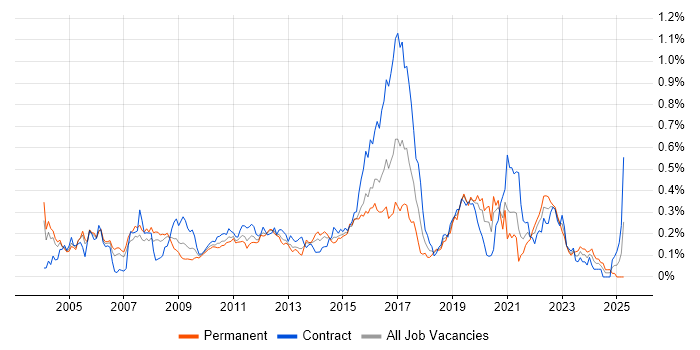Distributed Architecture
Central London > City of London
The table below looks at the prevalence of the term Distributed Architecture in permanent job vacancies in the City of London. Included is a benchmarking guide to the salaries offered in vacancies that cited Distributed Architecture over the 6 months leading up to 19 October 2025, comparing them to the same period in the previous two years.
| 6 months to 19 Oct 2025 |
Same period 2024 | Same period 2023 | |
|---|---|---|---|
| Rank | 129 | 162 | 180 |
| Rank change year-on-year | +33 | +18 | +91 |
| Permanent jobs citing Distributed Architecture | 2 | 2 | 4 |
| As % of all permanent jobs in the City of London | 0.13% | 0.072% | 0.13% |
| As % of the Miscellaneous category | 0.28% | 0.18% | 0.36% |
| Number of salaries quoted | 1 | 2 | 3 |
| 10th Percentile | - | £123,000 | - |
| 25th Percentile | £103,750 | £127,500 | £77,500 |
| Median annual salary (50th Percentile) | £107,500 | £135,000 | £80,000 |
| Median % change year-on-year | -20.37% | +68.75% | -23.81% |
| 75th Percentile | £111,250 | £142,500 | £82,500 |
| 90th Percentile | - | £147,000 | - |
| Central London median annual salary | £70,000 | £135,000 | £80,000 |
| % change year-on-year | -48.15% | +68.75% | -23.81% |
All Generic Skills
City of London
Distributed Architecture falls under the General and Transferable Skills category. For comparison with the information above, the following table provides summary statistics for all permanent job vacancies requiring generic IT skills in the City of London.
| Permanent vacancies with a requirement for generic IT skills | 706 | 1,117 | 1,125 |
| As % of all permanent jobs advertised in the City of London | 44.29% | 40.21% | 35.43% |
| Number of salaries quoted | 587 | 670 | 998 |
| 10th Percentile | £40,000 | £46,250 | £39,085 |
| 25th Percentile | £54,375 | £55,000 | £52,500 |
| Median annual salary (50th Percentile) | £75,000 | £75,000 | £75,000 |
| Median % change year-on-year | - | - | -3.23% |
| 75th Percentile | £102,500 | £93,750 | £97,500 |
| 90th Percentile | £132,500 | £117,625 | £122,500 |
| Central London median annual salary | £75,000 | £75,000 | £74,500 |
| % change year-on-year | - | +0.67% | -3.87% |
Distributed Architecture
Job Vacancy Trend in the City of London
Historical trend showing the proportion of permanent IT job postings citing Distributed Architecture relative to all permanent IT jobs advertised in the City of London.

Distributed Architecture
Salary Trend in the City of London
Salary distribution trend for jobs in the City of London citing Distributed Architecture.

Distributed Architecture
Co-Occurring Skills & Capabilities in the City of London by Category
The following tables expand on the one above by listing co-occurrences grouped by category. They cover the same employment type, locality and period, with up to 20 co-occurrences shown in each category:
